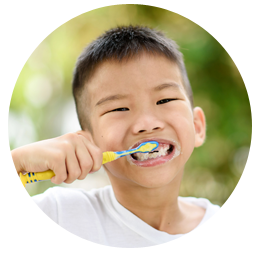Preventing Tooth Decay
Oral health affects a child in more ways than simply having a beautiful smile. Studies show that children with poor oral health have decreased school performance, more days missed from school, poor social relationships, and less success later in life. Children experiencing pain from decayed teeth are distracted and unable to concentrate on school work and often have a decreased self-esteem.
One serious form of decay that affects the youngest children is early childhood caries or ‘baby bottle tooth decay.’ This decay pattern is a condition caused by frequent and long exposure of an infant’s teeth to liquids that contain sugar. These beverages include flavored milks (chocolate, strawberry, vanilla), fruit juice, soda/pop, Gatorade/Powerade, and other sweetened drinks.
Putting your infant down for a nap or to bed at night with a bottle with liquid other than water can result in serious and detrimental effects on their teeth. Sugar in liquids pools around the child’s teeth giving plaque bacteria an opportunity to produce acids that attack tooth structure and cause rampant dental decay. This decay is very severe and can affect a baby’s growth and future development.
After each feeding, you should wipe your baby’s gums with a damp washcloth or gauze pad to remove the plaque. This will also make your child accustomed to having his/her mouth cleaned out and will make tooth brushing, when they do get teeth, an easier transition. Once your child has teeth, begin brushing with a toothbrush and a smear amount of fluoride toothpaste. The easiest way to do this is to put your child’s head in your lap or lay the child on the floor with his/her head between your legs. Often the bathroom is the most difficult place to brush. Whatever position you use, be sure you are able to see your child’s mouth easily.
Tips to avoid Early Childhood Tooth Decay/’Baby Bottle Tooth Decay’
- Brush your child’s teeth twice daily with fluoridated toothpaste.
- Do not put your child to bed with a bottle or sippy cup containing anything other than water
- Unsweetened fruit juice, sweetened drinks, flavored milks, Gatorade/Powerade, and soda/pop will all cause early childhood tooth decay. These beverages all contain A LOT of sugar which bacteria transform into acid and cause this very aggressive form of dental decay.
Importance of Primary (Baby) Teeth
It is very important to maintain primary teeth until they are naturally wiggled out. These teeth serve several critical functions.
Primary Teeth:
- Function to allow your child to chew properly and maintain good nutrition
- Develop speech to allow your child to communicate effectively
- Save space for permanent teeth to come into the mouth
- Improve general health because disease in the mouth can affect the rest of the body
- Promote self-confidence: a healthy smile can help children feel good about the way they look
Last but not least, maintaining and treating primary teeth early means less extensive and less expensive treatment for your child.
Infants and Children
Preventive dentistry begins with the first tooth. Children should visit the dentist no later than 1 year of age! Dr. Kaitlin and her staff will help to educate you on the latest available methods to protect your infant’s teeth from dental decay. The earlier the dental visit, the better the chance of preventing dental disease and ultimately helping your child achieve a lifetime of optimal dental health.
At the first visit we will present:
- A program of preventive home care including; brushing, flossing, diet and the importance of fluorides.
- A caries risk assessment.
- Information about Early Childhood Caries, which may be due to inappropriate nursing habits or inappropriate use of sippy cups.
- The latest facts about finger, thumb and pacifier habits.
- What you need to know about preventing injuries to the mouth and teeth.
- Information on growth and development.
Adolescents
Self-image and self-confidence are very important to adolescents. We understand that decayed or poorly positioned teeth or jaws may make your child more self-conscious. We provide a professional, sensitive and caring approach to restoring teeth and teaching preventive dental health care through the teen’s high school years. When necessary, we are able to provide information on sealants, oral piercing, wisdom teeth, and missing teeth. We will also monitor your child’s needs for orthodontics and help to educate you regarding when the right time is to pursue this care. Dr. Kaitlin has a good relationship with those who are providing orthodontic care in the area in order to make the appropriate referral.
Special Needs
Dr. Kaitlin’s two additional years of specialty training are very intensive in the most appropriate care for children with special health care needs and how to best serve your child in a comprehensive medical and dental aspect. People with significant medical, physical, or mental disabilities often present unique challenges. Dr. Kaitlin and her staff are trained to allow us to address your child’s unique special needs and provide the best care possible.

